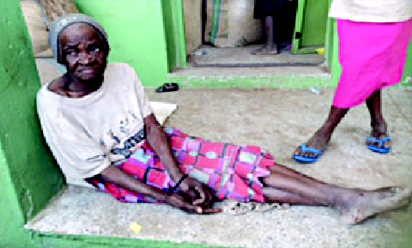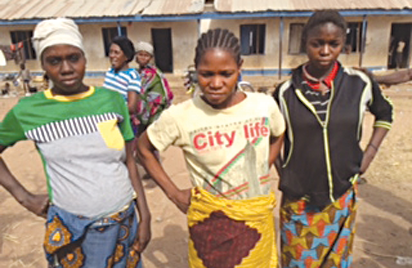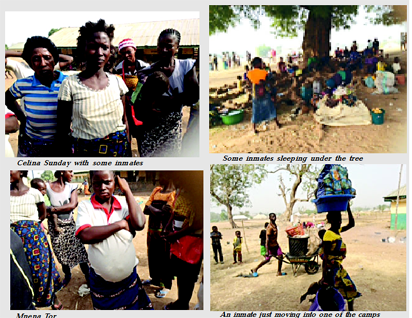102-year-old survivor of Benue killings, others sleep in the open in chilly harmattan in IDP camps


Several of the inmates had resorted to sleeping in the open despite the chilly harmattan weather.
They include pregnant women and children.
Though the camps seemed to have given the displaced persons some level of comfort in the face of adversity, the situation in the RCM Primary School camp left much to be desired.
The poor environmental situation there led to the fear of the outbreak of deadly diseases.
Unlike the Shelter Camp where some form of comfort is seemingly available for inmates, the RCM Primary School camp, housing about half of the displaced persons, could not boost of toilet facilities for use by the inmates.
The situation left the inmates with no option than to defecate and take their bath on the field adjacent the camp in public glare.
Most of the inmates sleep on bare floor in some structures that lacked doors and windows.
The situation is made worse by the continuous flow of new inmates into the camps and lack of adequate food to cater for the huge number of the displaced persons.
Medical attention for the sick and pregnant women also was posing a challenge.
SOS
Narrating their ordeal to Sunday Vanguard, some of the inmates, who acknowledged that the situation was beyond the state government, appealed to the international community and public spirited organizations and individuals to come to their aid.
102-year-old Mama Umem Shiga from Tse Nongo village, who is the oldest inmate in one of the camps, lamented her condition, stressing that she was saddened by the fact that herdsmen sacked her from her home at a time she was getting closer to her grave.
According to the centenarian, “At my present age, I should not be displaced. I ought to be in my home preparing for when God calls me.
“It is sad that this is happened to us at a time when things are so difficult and our children are managing to make ends meet.
“So many of our children have been killed and those who survived do not have homes anymore. The people who attacked us are not the Fulanis we used to know when I was growing up. They used to live with us and we marry one another.
“It is saddening because peace and love are strange words in our present day Nigeria. I pity the present generation, they have on their own destroyed a world that was before now full of brotherly love and togetherness.
“I am pained because my children lost everything they laboured for in the farms to this crisis. I was rescued by my children who carried me from our home because I can hardly walk.
“I thank God that many of my children are alive but the pain is too much especially when you remember that you have a home but cannot immediately go back and you are forced to live in a camp where there is nothing to be happy about because of lack of everything.”
On her part, seven months pregnant Umna Ajaver recounted how she escaped from the herdsmen who caught her and her five children at Asamgaba village Mbakuran Umenge.
“It was God who saved me and my children, because when we heard that herdsmen had come to attack us at about 5am of January 2, I hurriedly gathered my children and we made attempt to run away but the armed men who came in their numbers caught us.
“While they were questioning us, there came the sound of rapid gunshot from a nearby village and the men left us and started running towards where the sound was coming from.
“It was at that moment I told my children to start running and, for close to 30 minutes, we were running until we came to the road where we saw some families that were also running away on motorbikes and they offered to assist us get to Daudu.
“Surprisingly two of the men who attacked us were people who used to come to our village to graze their cows and I know them very well. One of them even asked of the whereabouts of my husband who, on the said day, was yet to come back from Makurdi.
“I thank God that we were saved because their intension was to slaughter us as they did to virtually everyone they caught.”
“The truth is that living in the camp is not easy because you live a life that is dictated by another person and there is no comfort no matter how those running the camp try.
“Though basic facilities are at the moment lacking, I think they are doing something about it, especially the issue of open defecation. That is a major source of worry for everyone.”
In the case of Christopher Mbakyo, his escape from Torkula village was a miracle “because they invaded our village on January 4 and killed many of our neighbours but I was able to run away with about six persons on my bike. That is how I found myself in this camp.

“But two days ago, my younger brother and I sneaked into our village to see if the soya beans we planted were destroyed. On getting to the village, we were shot at by herdsmen who we didn’t know were still camped there.
“We ran away leaving my motorbike which they obviously took away. We later realized that the security personnel drafted to our area only patrol the major roads and do not enter the interior parts of our villages, so the people have occupied our ancestral homes.
“My pain also is that we are going through hell in this camp; we lack food, where to sleep and medical care is a big problem.
“Though last Sunday food was shared in the camp, it was barely enough for the families camped here.
“We lack toilet facilities; so everyone defecates in the open and we all know the implication of that. In no distant time we may be recording outbreak of diseases.
“We need help. Government is doing its best, but the situation is actually beyond what the government can cope with. If help does not come as soon as possible, we may be recording deaths in this RCM School camp.
“The Red Cross also came and gave us medical attention but we need much more than what Red Cross can give us. Though UNICEF through BERWASA gave us some tanks for water, we still hardly get water. People go about looking for water to drink in the nearby stream. That is how bad the situation in the camp is.”
Some pregnant women, who spoke to Sunday Vanguard, also lamented their condition in the camp.
For Celina Sunday, a young pregnant mother of one, who said she escaped with her husband and her child from Ukpiam village, said her biggest challenge was that she sleeps on bare floor with her child.
“We were not able to escape with any property when the herdsmen attacked our village on January 2. It has been hell for me especially because of the pregnancy I’m carrying and I sleep on bare floor.
“Medical care is also another challenge because, since I moved into the camp, I have stopped attending antenatal care which is not very good for my six months pregnancy. We also lack mosquito nets which protect us from mosquito bites.
“Sometimes I am compelled to trek long distances in search of water because the borehole we have here does not function well.”
Same is the story of four months pregnant Mnena Tor, who moved into the camp after escaping herdsmen onslaught at Umenge on January 2.
She said, “I am very worried because we lack toilets and do not have any option but to defecate in the open. I am afraid for the children because they are all exposed to the danger of outbreak of diseases in the camp.”
Corroborating the sad tales of the inmates, the Chairman of the camp, Shiga Francis, acknowledged that the State Emergency Management Agency had been working round the clock to give comfort to the displaced persons.
Francis was also of the view that the situation in the camp was beyond the capacity of the state government in the face of limited resources.
“NGOs and SEMA have been rendering assistance to us within the limits of available resources, the condition in the camp is unbearable”, he said.
“Where to sleep is a big challenge. People sleep in the open; some sleep under the trees because there are no spaces for many to sleep. We lack adequate medical care and my worry is that we have many children and pregnant women in the camp.” Reacting to the situation in the camps, Angelina Omerigbe, an official of the SEMA coordinating the two camps in Daudu, said, “We are working closely with the displaced persons and we are doing our best to ensure that they get minimum comfort in the camps.
“Though there are obvious challenges here because people keep moving into the camps almost on a daily basis since they have nowhere to go.
“At the moment we are trying to get more space for them so that everybody can be accommodated within because people sleep outside and under trees and we all know that it is quite dangerous to allow that to continue because of the health implication.
“Another major challenge here is the lack of toilet facilities but we are working round the clock to address that issue because we cannot allow that to continue given the health implication.
“NGOs come here to run tests on them and refer the sick to the primary healthcare facility that is nearby, we are also doing our best to improve on that.
“We know of the challenge of water because boreholes don’t work well around this area but we are working hard to ensure adequate water supply.
“BERWASA donated water tanks in the camps and we ensure that water is supplied but it is still not enough because the number of the inmates increase by the day.
“The fact is that some of these challenges cannot be addressed overnight but we are tackling them gradually because nobody actually foresaw this crisis.
“The situation is no doubt beyond the government but with more support from good hearted people and international organisations we will surmount the challenges.
“At the camp A which is a permanent facility built by United Nations agencies, the situation is fairly better there but we still need assistance to meet their challenges and with more support from public spirited agencies and individuals we will surmount them.”
Sunday Vanguard gathered that over 4,000 children are among the inmates at the RCM Primary School camp.
Vanguard News



0 Comments:
Post a Comment
Subscribe to Post Comments [Atom]
<< Home